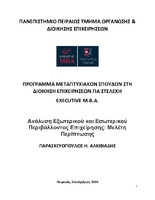Ανάλυση εξωτερικού και εσωτερικού περιβάλλοντος επιχείρησης : μελέτη περίπτωσης

View/
Keywords
DIMANDAbstract
Our era is characterized by continuous and intense developments. A highly dynamic environment in
which we operate demands flexibility and adaptability. During the five-year period 2019 - 2023,
humanity has faced a series of events that once seemed inconceivable and continue having
repercussions.
Events such as COVID-19, military conflicts on three continents, climate crisis, and the advent of Artificial
Intelligence introduced new dynamics. Such dynamics have impacted and driven dramatic changes in the
global economy, society, politics, and technological landscape. Inevitably, all these changes and constant
shifts in balances have also affected the largest investment haven, real estate.
This sector has a catalytic impact on the economy and interacts significantly with many other sectors. It
serves as a barometer for the economic prosperity of countries, flourishing alongside the economy
during periods of growth and declining during periods of recession and introspection.
In 2007, an unprecedented recession was triggered by the financial crisis that began in the United States
centered around the real estate market and "subprime mortgages", making it the largest crisis since
World War II. In the post-COVID era, China is experiencing its largest housing crisis, prompting the
Chinese central administration to urge local governments across the country to buy millions of unsold
housings from distressed companies to alleviate a prolonged real estate crisis.
Those developments are quite natural in a globalized environment during economic cycles. The Greek
economy has followed a similar cycle, with the recession in 2009 running its course, and after 15 years,
followed by a period of growth that approaches a 2.5% rate. Compared to the Eurozone, where growth is
below 1%, this is a significant differentiation. At the same time, the real estate market has been growing
at even higher rates, approaching double-digit returns for the past three years.
The positive momentum in the real estate market of all kinds (land, homes, offices, etc.) has been
significantly reinforced by the development of large infrastructure projects and Greece's strategic geo political location. Greece’s geography makes it a crossroads of three continents, attracting investment
interest from many public and private entities. There is a growing demand for sustainable and more
energy-efficient buildings, driven by both political-social stimuli, legislation on reducing energy
footprints, social activism and anticipated outcome of technological revolution we are experiencing with
the advent of Artificial Intelligence and the ongoing climate crisis. Such a crisis not only affects states but
also threatens the entirety of Earth.
In Greece, DIMAND has been pioneering urban regeneration projects since 2005 and innovating in the
development of properties that contribute to creating sustainable cities, adding value directly or
indirectly to the entire involved sector chain. This study will examine DIMAND's practices and
operational methods, depicting and evaluating its activities based on the theoretical principles of
strategic management.


